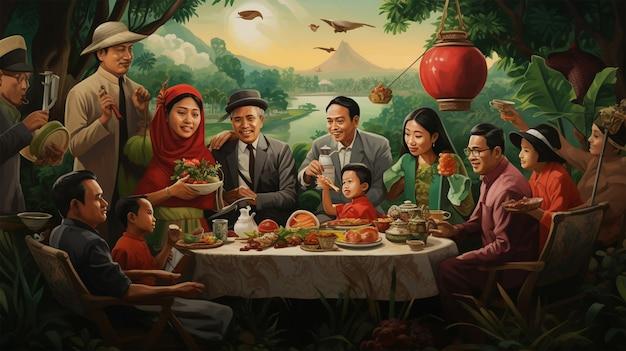The Filipino culture is rich and diverse, encompassing a blend of strong familial ties, traditional values, and a deep sense of community. At the core of this vibrant culture lies the Filipino family and the values that they hold dear. In this blog post, we will delve into the four core values that define the Filipino family, explore the positive and negative aspects of these values, and discuss how embracing these values can contribute to being a good Filipino citizen.
Understanding the Filipino Family
In the Philippines, family plays a central role in the lives of every Filipino. The concept of a nuclear family expands to include extended family members, relatives, and even close friends, creating a tight-knit support system. The Filipino family is known for their warmth, hospitality, and unconditional love for one another. In this blog post, we will paint a picture of a typical Filipino family and explore the values and traditions that shape their daily lives.
Join us as we embark on a journey into the heart of Filipino culture, uncovering the core values that have shaped generations of Filipinos, and discovering how these values contribute to creating a strong sense of community and identity. So, let’s dive in and explore the rich tapestry of Filipino family values together!

Filipino Family Values: A Glimpse into the Heart of the Philippines
The Warm Embrace of the Filipino Family
Picture this: a table laden with mouthwatering delicacies, laughter filling the air, and an overwhelming sense of togetherness. Welcome to a Filipino family gathering—a spectacle that exemplifies the essence of Filipino family values.
Love, Respect, and Close Ties — The Foundation of Filipino Families
In the heart of every Filipino family lies an abundance of love, respect, and close familial ties. These values are deeply ingrained in Filipino culture, transcending generations and influencing the way families interact and support one another.
Bayanihan: Unity in Filipino Families
The spirit of bayanihan, a Filipino term that refers to the act of communal unity and cooperation, thrives within Filipino families. In times of triumphs or adversities, relatives come together, pooling resources and expertise to tackle any challenge that comes their way. It’s like having your own team of superheroes ready to save the day!
Utang na Loob: The Bond of Gratitude
One of the most cherished Filipino family values is utang na loob, which translates to a debt of gratitude. It is deeply rooted in Filipino culture. Families prioritize reciprocating kindness and generosity, fostering a culture of gratitude, and ensuring that no good deed goes unrewarded. So, if a Filipino invites you for a sumptuous feast, consider it a friendly reminder for you to return the favor!
Respect for Elders: Papa and Mama Know Best
Filipino families place great emphasis on respecting elders. Parents are revered as the leaders of the household, and their wisdom and guidance are highly valued. It’s not uncommon to see multi-generational households in the Philippines, where grandparents play an active role in shaping young minds.
Balikbayan Box: Sending Love Across the Seas
When a loved one migrates overseas, they may be physically distant, but the bond remains unbreakable. Filipinos have a unique way of expressing their love and care through the balikbayan box—a care package filled to the brim with goodies from abroad. It’s like a treasure chest of love, bringing a piece of the world back home to their families.
Laughter: The Universal Language of Filipino Families
One cannot speak of Filipino family values without mentioning laughter. Filipinos have an innate sense of humor that can turn even the most mundane moments into a comedy show. From playful banter to hilarious anecdotes, laughter bridges the gap between generations, cementing the bond within the family.
Faith: A Pillar of Strength
For many Filipino families, faith is a central aspect of their lives. Religion provides comfort, guidance, and a sense of belonging. Attending Sunday masses or engaging in religious practices together strengthens the ties within the family and serves as a moral compass for navigating life’s challenges.
Wrapping Up: A Tapestry of Values
In a country known for its warm hospitality and vibrant culture, it is no surprise that Filipino family values radiate love, unity, and gratitude. From the strong bond of bayanihan to the enduring respect for elders, these values form the backbone of Filipino family life. So, the next time you find yourself in the presence of a Filipino family, prepare to be embraced by their powerful sense of togetherness and experience firsthand the beauty of Filipino family values.

FAQ: What are the Filipino Family Values?
What Are the Four Core Values of Filipino
As a vibrant and diverse culture, the Philippines has four core values that shape the Filipino identity:
Bayanihan (Community Spirit)
Bayanihan depicts the Filipinos’ strong sense of community and their willingness to help one another. It reflects the value of unity and collective effort in times of need or celebration.
Hiya (Sense of Shame)
Hiya embodies the value of personal dignity and social acceptance. It encourages Filipinos to avoid bringing shame to themselves or their families. This cultural norm influences personal behavior, promoting modesty and respectability.
Respect for Elders
Filipinos hold great reverence for their elders, emphasizing respect, obedience, and care. This value is deeply rooted in their culture, and it informs their interactions within the family and the wider community.
Utang na Loob (Debt of Gratitude)
Filipinos strongly believe in reciprocating kindness and gratitude. Utang na loob is the principle of repaying kindness or favors extended to them, fostering a sense of lasting connection and gratitude among individuals.
What Are the Filipino Family Values
The Filipino culture places immense importance on the family unit and upholds various core values within it. Some key Filipino family values include:
Close-Knit Relationships
Filipino families are known for maintaining close-knit relationships, characterized by strong bonds and emotional support. Family members often gather for meals, celebrations, and important life events, fostering a sense of belonging and togetherness.
Strong Parental Authority
Filipino parents are typically given utmost respect and authority by their children. Children are taught to honor and obey their parents’ guidance and decisions, emphasizing the value of filial piety and maintaining family harmony.
Extended Family Support
Filipino families extend beyond the nuclear unit, encompassing aunts, uncles, grandparents, and even close family friends. This extended family structure provides a wider support system and strengthens the ties between relatives.
Filial Piety
Filial piety, or respect and care for one’s parents and ancestors, is deeply ingrained in Filipino family values. Children are taught to prioritize their parents’ well-being, including providing financial support and taking responsibility for their care in old age.
How Do We Become Good Citizens of Our Country
Good citizenship is crucial for a thriving society. Here are some ways to be a responsible and engaged citizen of the Philippines:
Participation in Community Activities
Engage in community activities such as volunteering, participating in local events, and joining neighborhood associations. Taking an active role in your community helps build strong bonds and contributes to its overall development.
Respecting Laws and Regulations
Adhering to laws and regulations ensures a peaceful and orderly society. Respect traffic rules, pay taxes, and follow local ordinances. By doing so, you contribute to the stability and progress of your community and country.
Civic Engagement
Being aware of current events and participating in civic activities, such as voting in elections and staying informed about national issues, allows you to actively contribute to the growth and development of your country.
Promoting Equality and Empathy
Treat others with kindness, respect, and empathy. Support social equality and inclusion while rejecting discrimination or prejudice based on gender, religion, ethnicity, or socioeconomic status. Embracing diversity strengthens the fabric of society.
What Are the Positive and Negative Values of Filipino
The Filipino culture is rich with positive values that contribute to its vibrant community, but it also acknowledges negative values that are a part of its history. Here are a few examples:
Positive Values
-
Hospitality: Filipinos are notorious for their warm hospitality, welcoming guests with open arms and ensuring their comfort.
-
Resilience: Filipinos possess an incredible ability to bounce back from adversity, displaying strength and perseverance in times of hardship.
-
Creativity: Filipinos have a knack for creativity and resourcefulness, evident in traditional arts and crafts, cuisine, and entrepreneurial endeavors.
Negative Values
-
Colonial Mentality: A negative consequence of colonial history, some Filipinos still exhibit a preference for foreign products and ideas over their own local heritage.
-
Crab Mentality: This negative behavior refers to envy and pulling down those who are achieving success or progress.
-
Corruption: While not unique to the Philippines, corruption has been a challenge within the country. Efforts are being made to combat this issue and promote transparency.
How Can We Be Good Filipino Citizens
To be a good Filipino citizen, consider these suggestions:
Being Informed
Stay updated on current events and understand issues that affect your community and the Philippines as a whole. Knowledge empowers you to make informed decisions and actively participate in the betterment of your country.
Respecting Diversity
Embrace the diverse cultures, traditions, and beliefs within the Philippines. Treat everyone with respect, regardless of differences, and actively promote inclusivity and equal opportunities.
Acting with Integrity
Always choose honesty, transparency, and fairness in your actions. Uphold ethical values and be a role model for others. Maintain a strong moral compass in both personal and professional endeavors.
Contributing to the Economy
Support local businesses and industries. By purchasing Filipino-made products and services, you contribute to the country’s economic growth, job creation, and overall prosperity.
How Do You Describe a Typical Filipino Family
A typical Filipino family is characterized by its warm and harmonious atmosphere, where love, respect, and close relationships thrive. Family gatherings often revolve around delicious home-cooked meals, shared laughter, and heartfelt conversations. It is a place where celebrations are abundant, and the support for one another is unwavering. The extended family plays a vital role, with aunts, uncles, and grandparents offering guidance and love. In times of hardships, the Filipino family stands strong, facing challenges together and embodying the unwavering spirit of unity and resilience.
Keep in mind that these FAQs only scratch the surface of the rich tapestry of Filipino family values. Embrace and celebrate the uniqueness of the Filipino culture, and let it guide you towards becoming a better citizen, while fostering love and togetherness within your own family. Mabuhay!
